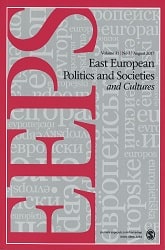Low- and High-Skills Equilibria in Central and Eastern Europe: What Role for the Government?
Low- and High-Skills Equilibria in Central and Eastern Europe: What Role for the Government?
Author(s): Silvana TarleaSubject(s): Labor relations, Political economy, Higher Education , State/Government and Education, Economic development, Human Resources in Economy, Socio-Economic Research
Published by: SAGE Publications Ltd
Keywords: higher education; political parties; research and development; skills supply; political economy;
Summary/Abstract: What determines the incentives of governments and businesses to invest in skills needed for higher value-added activities? While many factors matter, this article focuses on the motivations and the role of political parties in government. A policy analysis in Poland and Romania between 1989 and 2015, shows how governments can determine a change in the supply of skills even in relatively new democracies. We tackle the variation in the supply of sophisticated skills in the two countries and find that, unlike governments dominated by national-conservative parties, governments dominated by liberal parties have strategically steered the supply of skills in the economy. They have simultaneously identified and incentivized three key actors to invest in higher added value activities: (1) They have steered their higher education institutions towards offering degrees conducive to research and development; (2) they have incentivized students through scholarships or through secure employment by fostering links with enterprises; and (3) they have bargained with multinational companies to attract sophisticated activities. The article suggests that political parties should figure more prominently in political economy scholarship focusing on CEE. Moreover, this work speaks to a broader debate about the role of political parties in skill formation and in institutional change more generally.
Journal: East European Politics and Societies
- Issue Year: 33/2019
- Issue No: 01
- Page Range: 157-175
- Page Count: 19
- Language: English
- Content File-PDF

